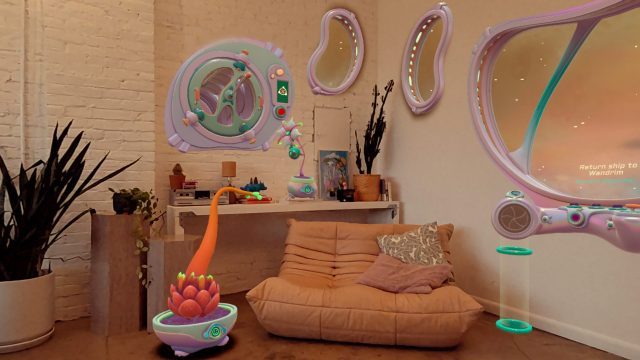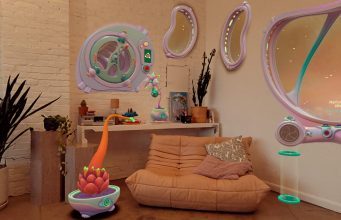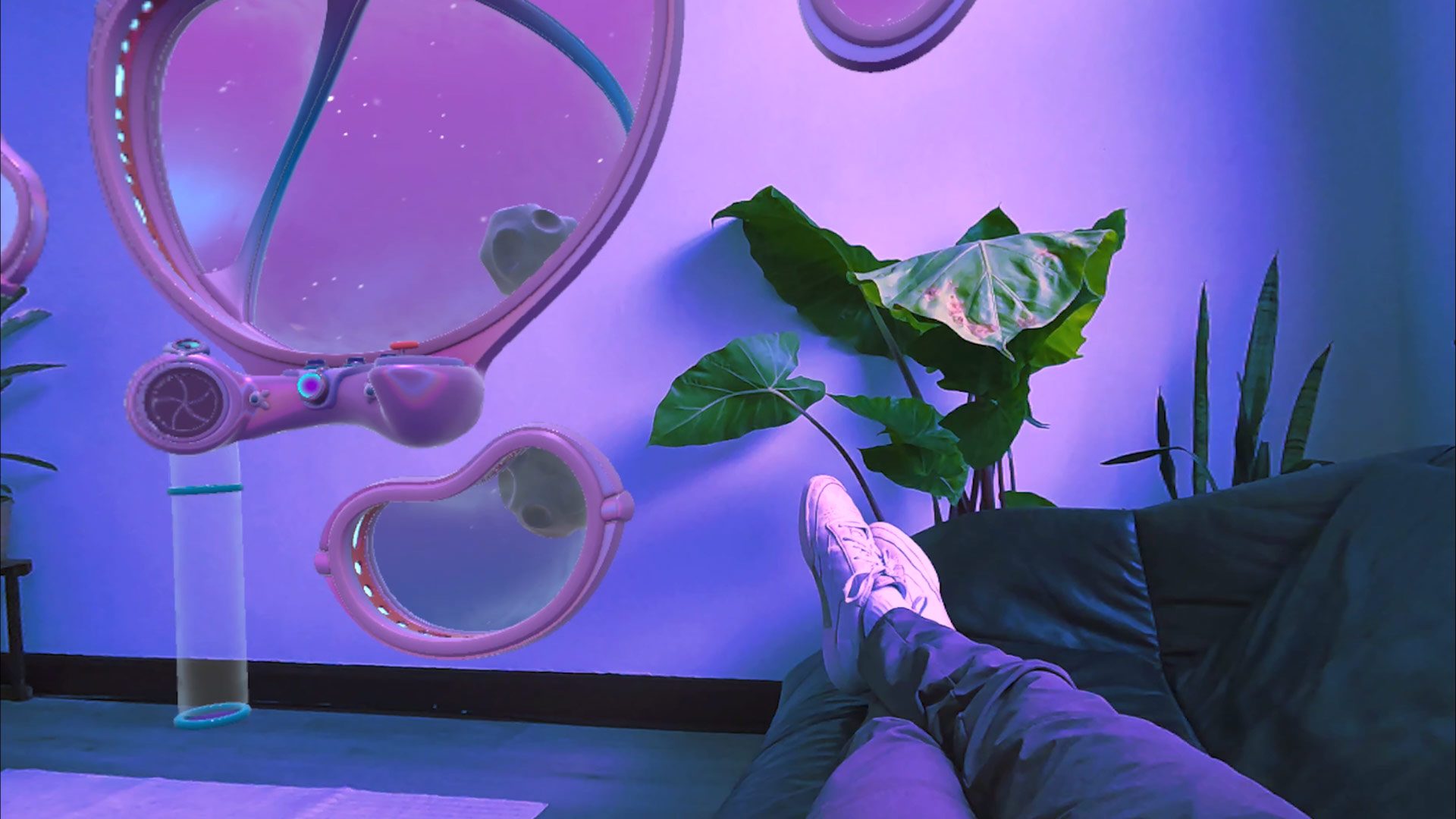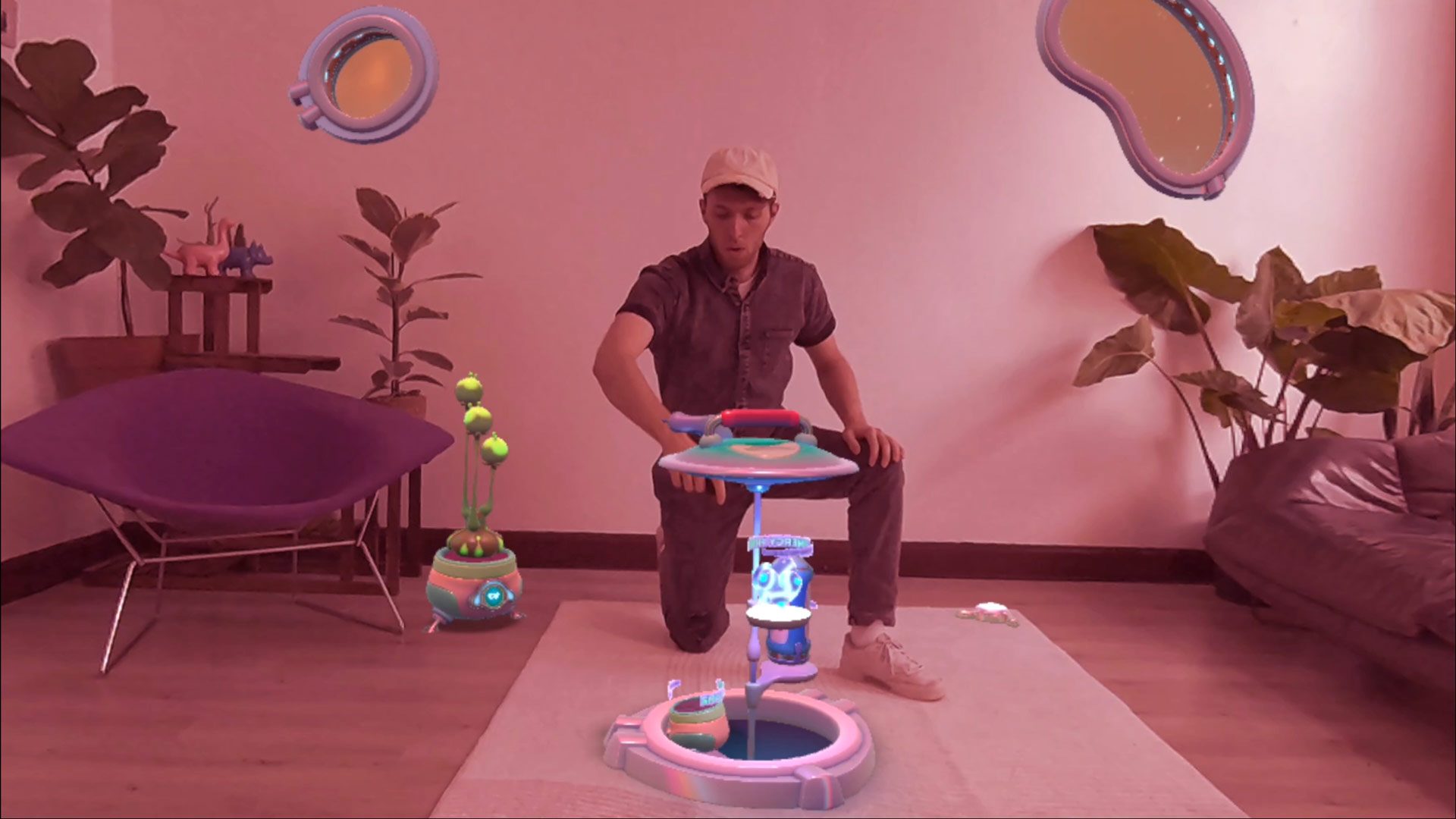

Starship Home isn’t just a clever and infectiously cute sci-fi gardening game with casual ship management stuff. It’s probably one of the best cases right now for how mixed reality developers can break away from the usual gimmicks on Quest 3, and create something truly worth playing in your own living room. Read on to see why I think you’ll fall in love with this big little MR game.
Starship Home Details:
Available On: Quest 3
Release Date: September 26th, 2024
Price: $20
Developer: Creature
Gameplay
Many mixed reality games struggle to find their reason for existence, with a rash of early entrants mostly relying on the coolness of doing ‘X’ in your own room. It’s led to some pretty low-hanging fruit which has lent MR games less prestige than they probably should have, especially given that headsets like Quest 3 and the newly unveiled Quest 3S hope to act as more than just an obvious upgrade path for Quest 2 owners. For Meta to bring MR to the masses, it needs to be more than just an optional mode to new VR games, or, for all its benefits, a handier way of grabbing a drink from your desk.
Some of this comes from Meta’s historical stance (now changing) on not allowing developers access to Quest’s cameras, limiting their ability to create games that can better digest your room and offer up the sort of granularity MR games need to transform your home into a backdrop for a truly compelling experience.
 Image courtesy Creature
Image courtesy Creature
Working with those same limitations, indie studio Creature seems to have really hit the sweet spot with Starship Home, offering you components to turn your living room, office, or bedroom (hell, it may even work in a bathroom) into your own spaceship, and doing it in way that finally feels like its on an even playing field with VR games. In short, I love it and I think you will too.
In Starship Home, you need to collect plants infected with an evil Blight, and bring the universe back into harmony. Here’s the basics of the gameplay loop, although there are some surprises along the way I won’t reveal.
Thrust aboard your own starship-home-office, your job is to find the plants scattered throughout the galaxy by traveling to alien worlds.
Freewheeling space explorers beware: ship-flying is essentially an on-rails experience that requires you to reveal planet coordinates on a 3D map and push a big ‘GO’ lever on your helm controls. This isn’t No Man’s Sky, after all. It’s a chill, fairly easy game that’s more about exploration and fun room-scale interactions.
Despite being on rails, there’s a good amount of interactivity involved in getting your spaceship to blast off to the next location. You’ll need to charge up your ship with energy blobs—which is found in a storage tank embedded in your floor—before making the trek. You’ll also need to scan the planet from orbit, and again down at the surface below using a drone to uncover its unique biome. Toss you ever-present robot buddy out the airlock so he can make his way to the planet and automatically collect them.
Bringing your plant back inside your ship, you now need to rid them of the evil Blight that’s taken over the galaxy by entering their dreams. Yup, these plants dream about weird stuff, and they even have personalities too.
Each dream is basically its own unique mini-game, which makes for a fun one-off puzzle, like bouncing raindrops down from the ceiling using little stepping stones, or squashing blight-ridden slugs with extendo-tentacle hands—all of it cast in different technicolor shades.
Now it’s time to plant your newly healed plant buddy and tune them to the right frequency. Because baby, these plants can sing.
Then it’s your job to feed them and keep them happily singing, which you can do by grabbing one of your squishy little buds from the terrarium and dripping the goo on your plant. You’ll also need to repot plants from time to time so they can grow and eventually morph into their final forms.
And keeping your plants happy is important. I’ve killed so many orchids IRL that I should be on a blacklist—even a cactus or two—but remembering which fertilizer-bro they need and when to water them feels less like a chore than I though it would. It’s more like a fun little mini-game in its own right, with plants rewarding you with a catchy little tune that syncs up in chorus when everyone is full-up on all the right fixins. If only real plants were so straight forward in their constant expectations of me.
Then, you just need to keep exploring the galaxy to find the source of the Blight.
In all, it took me around three hours, but you could easily play for longer depending on your individual speed since none of the action feels frantic, letting you sit back and mind your plants at your own pace and organize them by what sort of care they need.
And yes, I’m in love with this game despite it being a very chill, and maybe even slightly repetitive experience at times. It’s just so damn cute and quirky, and so full of surprises. Granted, there is a helpful alien bud who pipes in a little too much for my liking, but I can see why they’re tagging along. There’s a lot to do in Starship Home, and you’ll definitely need a hand not only learning the ropes, but keeping track of all of the many tasks you need to complete along the way.
My only wish is Starship Home were bigger universe and a little more off-rails. I want more (virtual) plants, more control over my ship, and maybe a little more organic exploration overall. Still, I couldn’t help but bob my head to my game’s catchy plant-derived beat, and dutifully care for my home’s new intergalactic garden in a way I’d never do with the the ragtag gang of languishing house plants who have survived for some unknown reason.
Botched botany side, Starship Home is by far the first mixed reality game that’s absolutely grabbed my brain, putting it squarely at the top of my library for more game sessions yet to come.
Immersion
While all of the whimsical gadgets in Starship Home could easily be placed in a virtual ship, even one tailored to your own room space, I’d still argue that MR passthrough is essential to the experience thanks to the game’s clever modularity.
At the beginning, the game lets you pop a variety of control panels, portholes, storage locker, and airlock wherever you want. The room orients itself to where your helm control and main window are located, although you can easily pop panels off the wall, and re-jigger your setup mid-game.
Having those portholes scattered around my home office—which is consequently also a full-time shoe depository—really sells the illusion that you’ve stepped aboard a little escape pod from reality, all the while serving as a ‘new’ environment to place my growing collection of plant buddies and gadgets.
Colored overlays sets the mood for each encounter too, with the constant shift of blue, red and purplish hues lending it a cool sci-fi vibe. In plant dreams, you’re always treated to some new, weirdly colored overlay that mentally brings you out of the ship, but still somewhere distinctly home-shaped, as dream mini-games use the real-world layout of your rooms as a backdrop.
 Image courtesy Creature
Image courtesy Creature
Diegetic interfaces are also everywhere, meaning the only screens you be reading are informational displays about those unique plants, which consequently have their own personalities. Smack a plant around, and it may even glare at you with a distrustful eyeball, or curl up into a ball and writhe in pain when you forget what fertilizer it needs. So be nice.
And while Starship Home could all be stuffed into a VR game, its smart modularity allows rooms of nearly any size to be transformed into a proper game space, which I think is additive and definitely not a gimmick.
Comfort
As a room-scale game, you won’t need to worry about artificial locomotion beyond the on-rails exploration your ship can do. That’s always a comfortable experience though, since your room is solid ground for all locomotion.
Quest 3’s mixed reality passthrough is pretty good, but is still in its infancy. Better, clearer, and quicker passthrough would improve everything from a long-term user’s standpoint, Starship Home included, although the game can’t be faulted for this. This really comes from a place of wanting to bring all of the gadgets and immersion the game brings to the table closer to my eyeballs, and therefore closer to reality.
While you could play seated by placing all of the controls at chair-level, some of the interactions in mini-games and accessing the ships storage locker require a good range of moment, making this primarily a standing, room-scale game.
‘Starship Home’ Comfort Settings – September 26th, 2024 |
|
Turning |
|
| Artificial turning |  |
Movement |
|
| Artificial movement |  |
Posture |
|
| Standing mode |  |
| Seated mode |  |
| Artificial crouch |  |
| Real crouch |  |
Accessibility |
|
| Subtitles |  |
| Languages | English |
| Dialogue audio |  |
| Languages | English |
| Adjustable difficulty |  |
| Two hands required |  |
| Real crouch required |  |
| Hearing required |  |
| Adjustable player height |  |
The post ‘Starship Home’ Review – Gardening Across the Universe in Quest’s Most Compelling Mixed Reality Game appeared first on Road to VR.
This is a companion discussion topic for the original entry at https://www.roadtovr.com/starship-home-review-quest-3-mixed-reality/